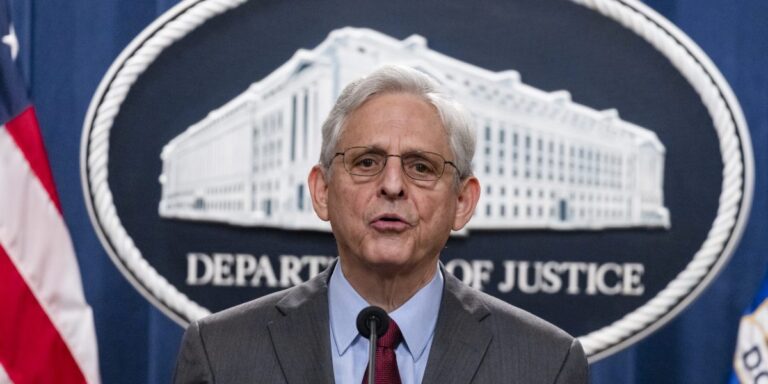
Ismael “El Mayo” Zambada, a longtime leader of Mexico’s Sinaloa Cartel, and Joaquín Guzmán López, the son of another infamous cartel leader, have been arrested by U.S. authorities in Texas, the U.S. Justice Department announced Thursday.
Leader of the powerful Sinaloa Cartel for decades alongside Joaquín “El Chapo” Guzmán, Zambada was known for directing the cartel’s smuggling operations while keeping a low profile.
The US Drug Enforcement Administration (DEA) had offered a reward of up to $15 million for information leading to his capture.
“The Department of Justice has taken into custody two additional alleged leaders of the Sinaloa Cartel, one of the most violent and powerful drug trafficking organizations in the world,” U.S. Attorney General Merrick Garland said in a statement. They were arrested Thursday in El Paso.
Zambada’s arrest follows the arrest of other senior members of the Sinaloa Cartel, including one of his sons and another of Guzmán’s. Guzmán López was also a son of “El Chapo” Guzmán.
According to Garland’s statement, Zambada and Guzmán López both face multiple charges “for directing the cartel’s criminal operations, including its deadly fentanyl manufacturing and trafficking networks.”
“Fentanyl is the deadliest drug threat our country has ever faced, and the Department of Justice will not rest until every cartel leader, member, and associate responsible for poisoning our communities is held accountable,” Garland said.
In recent years, Guzman’s sons have led a faction of the cartel known as the Little Chapos, or “Chapitos,” which has been identified as a major exporter of fentanyl, a deadly synthetic opioid, to the U.S. market. “El Chapo” Guzmán was sentenced to life in prison in the United States in 2019.
They were considered more violent and extravagant than Zambada. Their security chief was arrested by Mexican authorities in November.
One of them, Ovidio Guzmán López, was arrested and extradited to the United States last year. He pleaded not guilty to drug trafficking charges in Chicago in September.
In February, Zambada was indicted in the Eastern District of New York on charges of conspiring to manufacture and distribute fentanyl. Prosecutors described him as continuing to lead the Sinaloa Cartel, “one of the most violent and powerful drug trafficking organizations in the world.”
In 2021, a son of Zambada pleaded guilty in a U.S. federal court in San Diego to being a leader of the Sinaloa Cartel.
Ismael Zambada Imperial admitted in a plea agreement to being a major coordinator in the trafficking operation, including the importation and distribution of tons of cocaine, heroin and marijuana from Mexico to the United States.
Zambada, one of Mexico’s longest-serving capos, was considered the Sinaloa cartel’s strategist, more involved in day-to-day operations than his better-known and more visible boss, Joaquin “El Chapo” Guzman, who is serving a life sentence in the United States.
His close ties to Colombian cocaine suppliers and cells in the United States made Zambada one of the most powerful drug traffickers in the world. He had been a leader of the Sinaloa Cartel since the 1970s, whose main source of income was selling narcotics in the United States, according to the U.S. Justice Department.
Zambada was an old-school capo, at a time when young drug lords were known for their extravagant lifestyles, clubbing sprees and brutal tactics that included beheading, dismembering and even skinning their rivals. While Zambada fought those who challenged him, he was known for focusing on the business side of the trade and avoiding the horrific cartel violence that would draw attention.
In an April 2010 interview with the Mexican magazine Proceso, he acknowledged that he lived in constant fear of going to prison and that he would consider suicide rather than be captured.
“I’m afraid of being incarcerated,” Zambada said. “I would like to think that, yes, I would commit suicide.”
The interview was surprising for a baron known for keeping his head down, but he gave strict instructions about where and when the meeting would take place, and the article gives no indication of his whereabouts.
Zambada reportedly won the loyalty of residents of his home state of Sinaloa and neighboring Durango through his largesse, sponsoring local farmers and distributing money and beer in his hometown of El Alamo.
Although little is known about Zambada’s early life, it is believed that he began dabbling in drug trafficking as a hitman in the 1970s.
In the early 1990s, he was a major player in the Juarez Cartel, transporting tons of cocaine and marijuana.
Zambada began to gain the trust of Colombian traffickers, allegiances that helped him gain the upper hand in the cartel world with ever-shifting alliances. Eventually, he became so powerful that he broke with the Juarez Cartel, but managed to maintain strong ties to the gang and avoid a turf war. He also developed a partnership with “El Chapo” Guzman that led him to the top of the Sinaloa Cartel.
__
Verza reported from Mexico City. AP writer Christopher Sherman in Mexico City contributed to this report.


